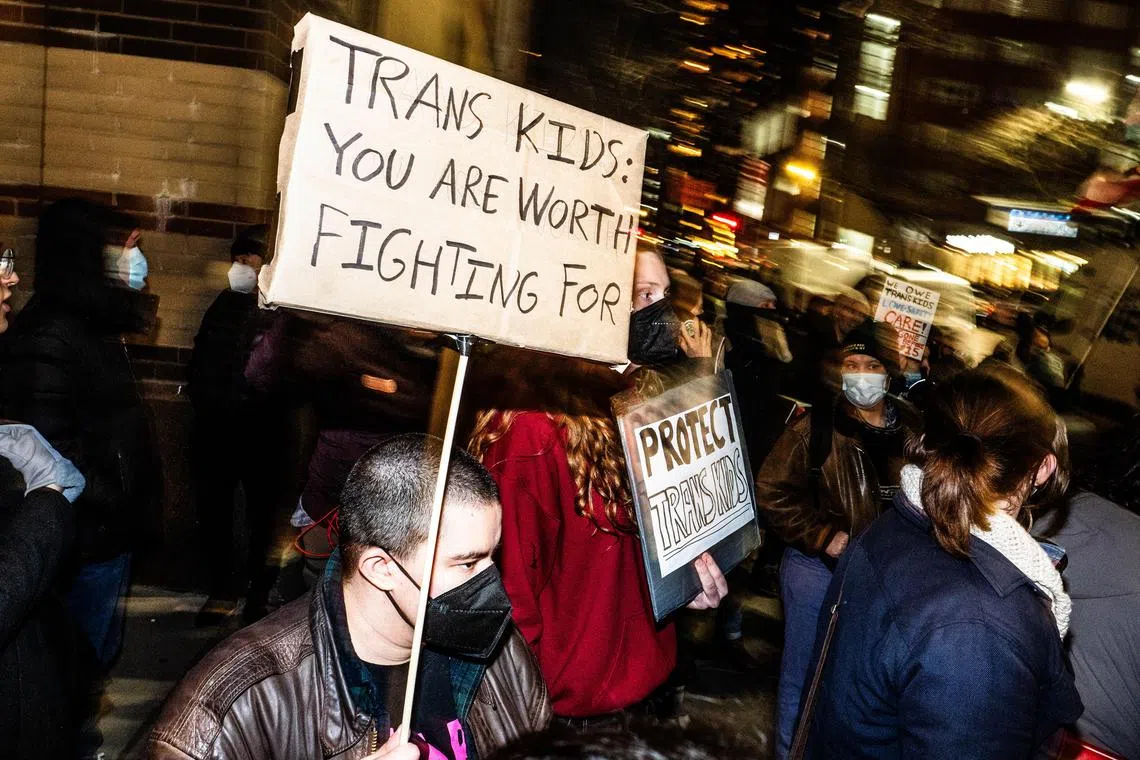What challenges could Trump’s executive order on transgender sports participation face?
Sign up now: Get ST's newsletters delivered to your inbox

More than 20 Republican-led US states have passed laws banning transgender girls from participating in female sports.
PHOTO: GRAHAM DICKIE/NYTIMES
WASHINGTON – US President Donald Trump’s executive order aiming to keep transgender girls and women out of female sports teams
Many states have instituted similar bans in recent years, sparking legal challenges, and Mr Trump’s action is likely to face lawsuits as well. Here is a look at how the dispute has played out in court so far, and how it could continue.
What laws have been passed over transgender students in sports?
There is no federal statute on the issue, but more than 20 Republican-led states have passed laws banning transgender girls from participating in female sports.
Proponents of these laws say they are needed to ensure fairness in girls’ sports by keeping out transgender athletes who may have a biological advantage. Opponents say they are discriminatory and transgender girls do not necessarily have an advantage.
How does Trump’s order compare to state laws?
Mr Trump’s order seeks to do the same thing as state laws – prevent transgender girls and women from competing on female teams.
It relies partly on the authority of the US Justice Department to bring enforcement actions under Title IX, the federal law that bars sex discrimination in education and requires schools to offer girls an equal opportunity to play sports. Under Mr Trump’s interpretation of Title IX, the law forbids transgender girls from playing in girls’ sports.
It also instructs the US federal government to begin enforcement immediately by cutting off federal funding for schools that do not comply.
What kind of legal challenges could be brought?
Challenges are likely to mirror those already brought against state laws.
Transgender athletes and their families have sued to block state bans alleging that the laws violate their right to equal protection under the US Constitution, as well as Title IX, which they interpret to protect transgender girls’ right to play in girls’ sports.
They have cited a 2020 US Supreme Court ruling finding that discriminating against transgender people is discrimination on the basis of sex, which is prohibited by Title VII, a federal law banning employment discrimination. Though they are separate laws, Title IX and Title VII have often been interpreted similarly by courts.
What have courts said about existing laws so far?
Several legal challenges have succeeded in blocking enforcement of state laws, at least against the plaintiffs who brought those challenges.
The Ninth US Circuit Court of Appeals, which hears appeals from nine western states, struck down Idaho’s law against transgender athletes playing in the sex category matching their gender identity, finding that it likely discriminated on the basis of sex. Idaho was the first state to pass such a law.
The Ninth Circuit and the Fourth Circuit, which covers several mid-Atlantic and south-eastern states, have also blocked bans from being enforced against specific plaintiffs in West Virginia and Arizona. A federal judge in Concord, New Hampshire, has blocked that state from enforcing its ban against two plaintiffs.
However, a state court judge in January allowed Nassau County, New York, to enforce a law prohibiting transgender girls and women from playing in female sports at county-owned athletic facilities.
The rulings so far have come at early stages in the litigation, blocking enforcement while the lawsuits remain pending. Any of the cases could eventually be appealed to the Supreme Court, which is likely to ultimately decide the issue. The Supreme Court declined to hear an appeal of the Fourth Circuit ruling at a preliminary stage.
What did the Biden administration do on this issue?
Former Democratic US president Joe Biden’s administration proposed a federal rule preventing educational institutions that receive federal funding from categorically excluding athletes based on their transgender status. The proposed rule, based on Title IX, would have allowed limitations on participation for reasons of fairness or to prevent injury.
The Biden administration dropped the rule in December 2024, citing unfavorable public comments and ongoing litigation over how Title IX applies to the issue. REUTERS


